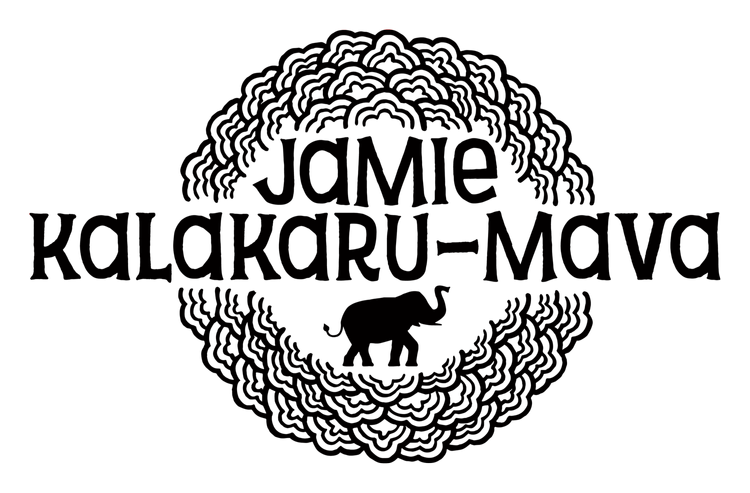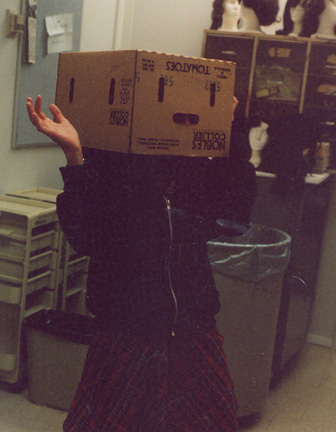Here are things you shouldn’t need to know about me to make any of your decisions on wether you should be my friend, colleague, or acquaintance:
I’m coming out.
I’m 36 years old, I’ll be 37 this summer. (I think? ::checks her math.:: Yes, I’ll be 37.) I’ve got a beautiful not-so-little-anymore 2 1/2 year daughter and I’m mostly happily married. (Hey, raising a toddler can be hard for a couple! MOSTLY happy is still a lot of happy.)
So, why come out now? Am I leaving my husband? Are there big changes in store for me? None that I’m planning. Even though what I’m writing is about myself, this isn’t all about me. Also I’m coming out in a variety of ways. Welcome to the Pandora’s box that is my life - here you go, friends - enjoy!
Lately I’ve been hearing this word a lot more: “Self identifying.” Have you used that word before or heard that term?
As I, along with my fellow nonprofits, work on issues of accessibility and taking down barriers, we collect information on a variety of things. This helps inform the work we do, or at least that’s what we tell our boards and funders. We ask about audience members with disabilities - to which point we might then ask - “Well, do they self-identify as such?” We talk about the diversification of our audiences and “reflecting the community we serve.”
Not everybody with a disability identifies as “a person with disabilities.”
Not every body with a mental health issue identifies as somebody “with a history of mental illness.”
Not everybody that fits in diversity boxes puts themselves in one or the other, not everybody labels themselves in the same way others seek to categorize. Are there books at the library that could go on more than one shelf? If I had a dollar for every time I checked the “other” box I’d have enough money to hire a personal assistant so that I never had to fill out another form again. (Oh my god, that would be great.)
Without further adieu, here are those things.
I am a woman of color.
My father born in Sri Lanka. My mother was born in Poland. They met in this country and that’s where my sister and I were born. No, my name does not sound “exotic” and no, I don’t look traditionally Indian (because Sri Lankans aren’t Indian, that’s a different country.) I am a first generation American citizen of mixed ancestry. I am #HAPA. I might not look like a traditional “woman of color” but I’d really love to hear you describe what that looks like, really. Wanna give it a go?
When I sit at a board and hear people across the table from me talk about how we are not diverse organizationally, or when I sit through staff trainings that describe an organization I work at as an “All White Company” it makes me feel invisible.
Yes, these things happen. You would be seriously so surprised at what I’ve seen and heard come out of board rooms thanks to this wonderful cloak of mixed-race invisibility. Then again, maybe you wouldn’t be all that surprised.
This is why I’m coming out as a woman of color.
I am bisexual.
“But aren’t you married?” Yes, and?
This is something my husband knew when we met and hasn’t really affected our relationship - and there’s no reason why it would need to.
“But why bother coming out if you are married?” Therein lies much of the point of this post. Why ever would I need or want to self-identify especially in an environment of hate crimes, bigotry, slut-shaming and tropism? I had it “easier” because I happened to fall in love with and marry the man I fell in love with… but what if I hadn’t? And was it really “easier?” I mean - Have you *seen* Chasing Amy?
When you (or your colleagues) make a comment about sexuality being a “choice,” you are talking about me.
I am not trope. Those that I have told in prior lapses of poor judgement have taken this information and immediately asked about my history, made jokes about my close friends (as though that’s how this works) and questioned my sincerity.
And there are those in my family and my relations that still do not support gay marriage. Who continue to purport the myth that sexuality is a choice. Tell me, is it for you?
This is why I’m coming out as bisexual.
I am of jewish ancestry.
Why did my mother’s family come to this country in post-war Poland? Why did my grandfather have to flee Poland on September 1, 1939? Why is it a little less funny to me when you make jokes about Nazis and liken grass-roots public officials to people that are at least part of the reason I don’t have more first cousins on my mother’s side to rival the serious grip of cousins I have on my father’s side?
It’s certainly not the part of my ancestry that I identify mostly strongly with. I talk about this a little bit more here: (Are you Jewish? http://www.purenoumena.org/blog/?p=2518) But it’s definitely something that I think about anytime somebody likens something to the holocaust, or anytime I read yet another mind-numbing article about somebody who is a holocaust denier. Anytime you make a joke about me being a grammar nazi. (Just kidding, I don’t mind those. This post might lead you to believe otherwise but I’m not entirely without a sense of humor, really.)
Because people ask me if I’m Jewish because of my nose.
Because I have overhead people describe somebody “Jewing somebody down to ____(a lower figure)___” and my jaw dropped because holy shit what decade is this?
Because denying the holocaust is insulting and it happens more often than you think.
This is why I’m coming out as having Jewish ancestry.
I'm agnostic.
I was raised in a religious household and spent most of my formative years in parochial school. After decades of thought and study, after having read the Bible (several times through), the Quran, and a number of "major" and "minor" religious texts, after studying the history of religion extensively, I have come to only one place:
We don't know far more than we do.
Professing otherwise is arrogant and can be potentially destructive. And it has been deadly.
Agnostics don't really have a home. Atheists are typecast as angry and hyper vigilant. Maybe because those of us that are quiet about our faith (or lack thereof) don't speak up often enough, and only the squeaky wheels are being heard. Atheists and agnostics are not without values. We are not all angry nor are we all anti-faith.
That is why I'm coming out as agnostic.
I am a survivor of abuse.
Jokes about political disagreements and religious differences aside, my family is an infinitely happier and more positive one than what it was growing up. People grow and change and there are things that are culturally normal and accepted in other countries that aren’t (or shouldn’t) be here. These are things that many other immigrant families struggle with in a new country and we were not any different.
Out of respect for my family’s privacy I rarely go into details and will not here - this post is already long and personal enough. But the fact that I am a survivor of abuse is something that absolutely and unequivocally affects the work I do, even single day. With new immigrant families, with domestic violence victims, with women who have endured abuse at the hands of their partners and caretakers, artists suffering from anxiety and depression.
Because you never know who you are working with or what their struggle is. When somebody flies off the handle or exerts their privilege and power, they’re not always thinking about what type of reaction or post-trauma level stress that might trigger in another.
Because the wounds of emotional abuse run deep, and they create very real scars for those that endure them;
Because YES, all women;
Because yes, these things happen - even though not everybody that endures them talks about them wears them as a label, nor do we need to, nor is it our obligation to educate you about them;
Because I learn that other people I consider strong, intelligent and wonderful have also survived abuse and this has helped me;
This is why I’m coming out as a survivor of abuse.
Why now?
There are a variety of micro-aggressions and deterrents that have kept me from “coming out” in a variety of ways, ways that have thus far outweighed the seemingly unnecessary need to label myself as one thing or another.
- Because sometimes others speak or joke about coming out as “easy now” or “cool” instead of encouraging others to also come out with the understanding that *everybody’s struggle is sincere and all their own;*
- Because sometimes others say people are playing the “race card” when they bring up or speak of their ethnicity;
- Because over the past years since 9-11, when other people ask where my family is from and ask with an eye of suspicion instead of what used to be an eye of curiosity;
- Because for a long time I worried that sharing this or wearing these things on my sleeve wound somehow bring shame to my family (it doesn’t, we’re better) affect my hiring it shouldn’t, I’m awesome) or affect my relationships (it won’t, it shouldn’t, and I’m pretty sure my family loves me a lot.)
Unless my board fires me and my family disowns me (both hopefully quite unlikely at this point) I don’t anticipate my life to change ALL that much as a result of this post.
But at an event last week I found particularly inspiring one of the speakers pointed out that “women tend to make choices that benefit themselves only when others are benefitted as well.” We talked about how our voice is one of the most powerful tools we bring to the work we do. We talked about how what we do and how we act shapes our children as they, quite often, mirror our choices and our identities.
My pledge was this: “In 2016 I will use my voice without apology (or a mile-long justification.)”
I thought about how it helps no-one for me to continue to check the “other” box. How it does not help anybody for me to remain invisible at board meetings without calling the bullshit I see at these tables *almost daily.* How it’s hard to preach about being an ally if I don’t support my own voice and be authentic about my own identity.
When I got dressed today I felt like it was a big day. I picked my dress and put it on and thought jokingly to myself “this is the outfit I will be wearing the day I come out.”
I wore a skirt. I usually do.









